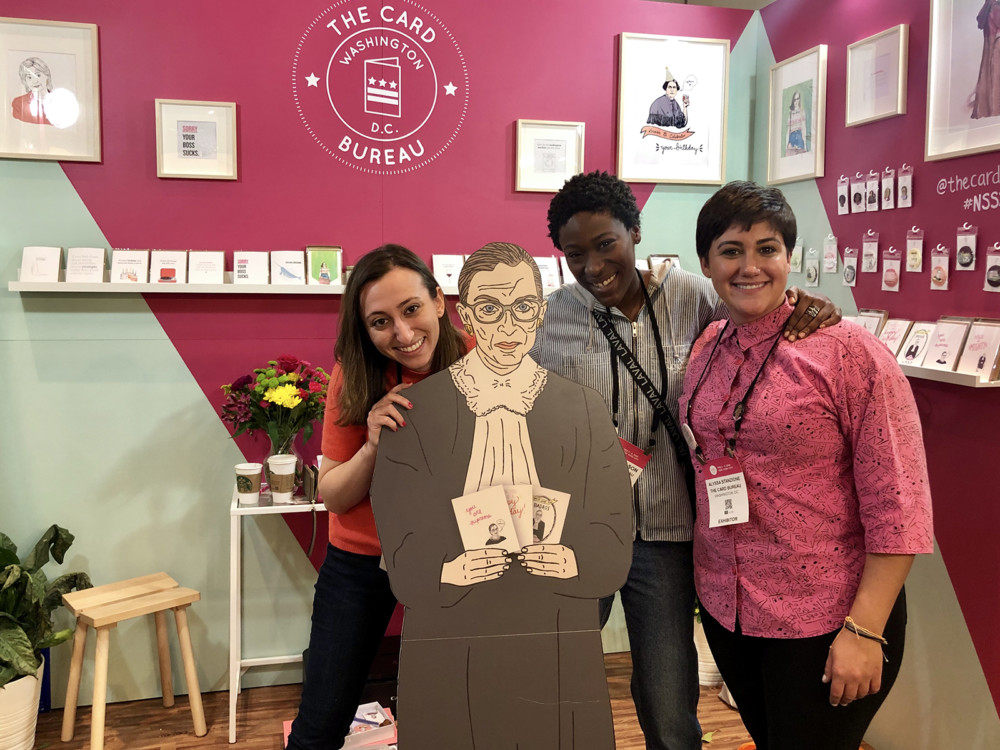By Clyde McGrady
CQ-Roll Call
WWR Article Summary (tl;dr) As Clyde McGrady reports, “More RBG-inspired products keep emerging in every corner of the internet, including a baby bib from clothing and printing company Raygun made to look like one of the distinctive collars she wore over her judicial robes.”
Washington
At first Janie Velencia thought she was in trouble. The former journalist, who was running her own greeting card company, had just received a message from an assistant to Supreme Court Justice Ruth Bader Ginsburg.
“I panicked,” says Velencia, who’d been making greeting cards with Ginsburg’s likeness for a couple years.
The email didn’t say what Ginsburg wanted. “I thought, ‘Oh gosh, maybe I’ve offended her or she doesn’t like it,'” says Velencia.
But that wasn’t the case. Apparently someone had given a card to Ginsburg, who wanted to order some to pass out to friends and family.
“That was amazing,” says Velencia. “I guess I never really thought she would ever see it.”
The business owner packed up the cards and sent them, and got a signed one in return. It was surreal to see RBG’s handwriting next to the cheeky image printed on the front, a portrait of the justice herself wearing a party hat tipped at a rakish angle.
“Cheers,” she had scrawled.
By now the legacy of the justice, who died last week, is intertwined with the piles of merchandise that sprung up around her in later years, from tiny Halloween costumes to T-shirts featuring some punny usage of the word “supreme.”
Designed by artists and admirers, more RBG-inspired products keep emerging in every corner of the internet, including a baby bib from clothing and printing company Raygun made to look like one of the distinctive collars she wore over her judicial robes.
In the merchandise, she is an icon. But when she reached out to Velencia, she was a person, which was jarring. “It was pretty special,” Velencia says.
Velencia and her friend Alissa Scheller started the Card Bureau in September 2016, in the middle of a heated presidential campaign that many pundits assumed Hillary Clinton would win.
“We started this as a fun, creative outlet,” Velencia says. “I just wanted to make stuff that I’d buy that I couldn’t otherwise find in stores.”
But there was something about the RBG greeting cards that resonated with their customers.
Ginsburg had long been a feminist and liberal icon among legal circles, but it was her stinging dissent in a 2013 voting rights case, combined with internet fan and meme culture, that catapulted her into celebrity.
The case, Shelby County v. Holder, determined whether state and local governments with histories of discrimination should be required to get federal government permission before making changes to their voting laws.
The majority ruled that the formula used to determine which jurisdictions needed permission was outdated and therefore unconstitutional.
Ginsburg disagreed, writing that ending the protections was “like throwing away your umbrella in a rainstorm because you are not getting wet.”
Soon after, a student at New York University’s law school started the Tumblr blog Notorious R.B.G., and then followed up with a book.
“There just weren’t a lot of people to make you feel good at the time,” Velencia says. “I just think there was, and still is, a big void of female leaders we can all look up to.” For a lot of women, RBG was that figure.
“We can’t all be like Beyonce or Taylor Swift, you know?” says Velencia. But for ambitious professional women in the white collar world, RBG was more relatable (though Velencia acknowledges not everyone can be a Supreme Court justice either). “We get a lot of orders from lawyers or law school grads.”
In the Card Bureau’s early days, before the RBG merchandising market became so saturated, her cards made up about 40% of Velencia’s revenue. “I only was really able to sell them in stores around Capitol Hill, which is where I lived at the time. And it just started out as a shoe box of cards under my bed.”
Since Ginsburg’s death, the Bureau’s RBG sales have skyrocketed, jumping from a typical day of 60 to 70 orders to close to 400, according to Velencia. (She says she’s donating half the profits from retail sales of RBG products to the Women’s Rights Project, which Ginsburg co-founded in 1972 as a lawyer with the American Civil Liberties Union.)
The initial boost from RBG, the person, not the icon, came just when Velencia needed it. Having started the business as a side gig while working at the Huffington Post, she wasn’t sure if it was something she wanted to continue.
“If it weren’t for her, I probably wouldn’t have taken this unexpected path,” she says. “And this card company that’s grown into a gift and candle company would probably not exist.”
___
Distributed by Tribune Content Agency, LLC.














































































































































































































































































































































































